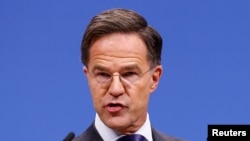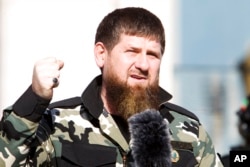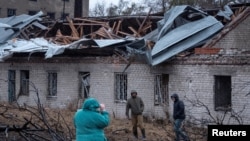NATO's secretary-general warned Thursday that Russian President Vladimir Putin wants to “wipe Ukraine off the map,” and he urged the bloc “to shift to a wartime mindset and turbocharge our defense production and defense spending."
In a speech Thursday in Brussels, Mark Rutte said Russia was "preparing for long-term confrontation, with Ukraine and with us.” He added that Europeans need to brace themselves for the possibility of Russia using “swarms of drones” on the continent. Putin, he said, "is trying to crush our freedom and way of life."
“We are not ready for what is coming our way in four to five years,” said the former Dutch prime minister, who warned that NATO states might need to give more than the standard 2% of gross domestic product for military spending that's required for alliance membership.
During the Cold War, Rutte said, Europeans spent more than 3% of their GDP on defense, a sum that U.S. President-elect Donald Trump has also urged NATO members to pay into the alliance.
Only 23 of NATO’s 32 members are expected to meet the 2% target this year, according to the bloc. Rutte said Russia would probably spend up to 7% or 8% of its GDP on its military next year.
Russia is already engaged in a “coordinated campaign to destabilize our societies,” Rutte warned, citing recent “hostile actions” that Moscow has launched against NATO members, including cyberattacks and assassination attempts.
“Danger is moving towards us at full speed,” Rutte said. “We will not be safe in the future unless we are prepared to deal with danger."
Drone attacks reported
Meanwhile, the head of Russia’s Chechnya region said Thursday that a Ukrainian drone attack had hit a police barracks, injuring at least four people.
Ramzan Kadyrov said on Telegram that a drone had damaged the building’s roof and windows and also had caused a small fire.
The attack was the second to hit a police facility in the region this month, according to Kadyrov.
Russia’s Defense Ministry said Thursday that it had shot down a drone over Chechnya, as well as four drones over Kursk, three over North Ossetia and eight over Russia-occupied Crimea.
In Ukraine, the governor of the Kherson region said Russian drones had attacked Thursday, with one injuring a man in the city of Kherson.
Missile warfare
Kremlin spokesperson Dmitry Peskov said Thursday that Russia would respond to Ukraine’s use of U.S.-supplied ATACMS missiles, which Russian defense officials said were used in a Wednesday strike on an airfield in Taganrog.
"The response will follow in a manner deemed appropriate. But it will definitely follow," Peskov said.
A U.S. official said Wednesday that a U.S. intelligence assessment had concluded Russia could launch another of its experimental hypersonic ballistic missiles against Ukraine in the coming days, although Washington does not consider it to be decisive in the nearly three-year war.
Russia first fired the Oreshnik missile at the Ukrainian city of Dnipro on November 21, in what Putin characterized as a response to Ukraine's first use of long-range U.S. and British missiles to strike more deeply into Russian territory with Western permission.
"We assess that the Oreshnik is not a game-changer on the battlefield, but rather just another attempt by Russia to terrorize Ukraine, which will fail," the U.S. official told reporters. There was no immediate response from Russia.
Putin had said that Russia might fire the Oreshnik missile again, possibly to target "decision-making centers" in Kyiv, if Ukraine kept attacking Russia with long-range Western weapons.
The Russian leader has claimed that the Oreshnik is impossible to intercept and that it has destructive power comparable to that of a nuclear weapon, even when fitted with a conventional warhead.
Some Western experts have said the novel feature of the Oreshnik is that it carries multiple warheads that can simultaneously strike different targets — a capability usually associated with longer-range intercontinental ballistic missiles.
Nonetheless, the U.S. official downplayed the usefulness of the missiles, calling them "experimental" in nature and saying that "Russia likely possesses only a handful" of them. The official also said the weapon has a smaller warhead than other missiles Russia has deployed in Ukraine.
Some information for this report came from The Associated Press, Agence France-Presse and Reuters.







